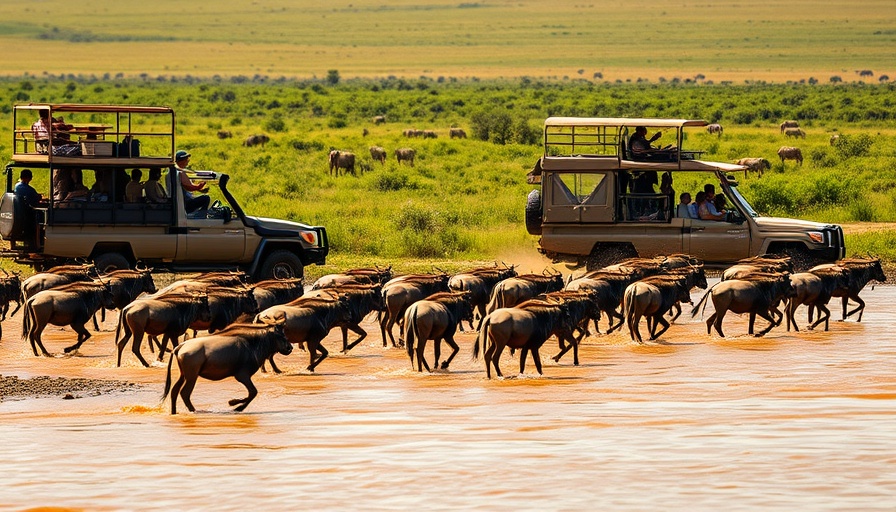
Unprecedented Actions Amidst Nature's Spectacle
A recent viral video showcases a disturbing scene in Serengeti National Park, where a professional guide, Nick Leer, captured the moment during the Great Migration—a natural phenomenon where thousands of wildebeests attempt to cross perilous rivers in search of greener pastures. While visitors flock to witness this breathtaking journey, Leer expresses outrage at the irresponsible behavior of some tour guides, who allegedly encouraged tourists to block the animals’ access to the river. As tensions rise among wildlife enthusiasts about the boundary between human influence and nature, it raises pressing questions about ethical wildlife tourism.
The Dynamics of the Great Migration
The Great Migration, which attracts travelers and wildlife lovers from around the world, is often hailed as one of the most extraordinary wildlife events. Each year, starting from Kenya's Serengeti to Tanzania's Maasai Mara, animals face dramatic challenges, including predators, geographical obstacles, and even poaching threats. However, human interference, such as crowding the rivers to capture the perfect photograph, can exacerbate the stress on wildlife during these crucial crossings. Highlights from the latest incident illustrate how tourism practices sometimes compromise the very experiences they aim to celebrate.
A Call for Ethical Wildlife Tourism
This incident invokes a critical conversation on responsible travel practices. Travel enthusiasts—particularly eco-conscious adventurers and potential tourists—are encouraged to reflect on their role in wildlife conservation. Instead of seeking merely Instagrammable moments, observers are reminded of the need for an ethical approach that respects animal welfare. Advocates emphasize considering establishments committed to sustainable practices, which promote not only animal safety but the preservation of their habitats.
Informed and Empathetic Travel: A Growing Trend
As regular travelers become increasingly aware of ecological issues, compassionate tourism is on the rise. Tour operators dedicated to eco-tourism emphasize the importance of maintaining an equilibrium between human presence and wildlife. Now more than ever, there is a push for visitors to support policies that enhance conservation efforts, such as wildlife sanctuaries and eco-lodges that prioritize preservation and provide cultural experiences that respect nature.
Community Stories: Local Voices in Conservation
Local communities play a crucial role in wildlife conservation in South Africa and beyond. Engaging indigenous voices nurtures a more profound appreciation for cultural heritage while fostering collaboration between tourism and conservation efforts. Sharing personal anecdotes from community members who have witnessed the perennial battle for survival that animals face can create a deeper emotional connection, encouraging tourists to prioritize responsible experiences. These stories remind us that the fate of wildlife is intertwined with the livelihood of many communities.
Traveling Sustainably: Tips for Eco-Conscious Tourists
Eco-tourists must embrace proactive strategies when planning their trips. From opting for tours committed to ethical practices to seeking local guides who understand wildlife movements, travelers can make decisions that positively impact conservation efforts. Consider manageable steps such as reducing waste, supporting local businesses, and choosing accommodations that emphasize green initiatives.
Resilience of Nature: Lessons from the Serengeti
The draw of witnessing the wildebeest migration is undoubtedly compelling. However, each crossing reminds us of the resilience of nature and the fragility of ecosystems. As human beings, we have the responsibility to ensure that our love for exploration does not overshadow the sanctity of the wild. Reflecting on these events calls on us to enhance our travel approaches, encouraging greater respect for all beings that share our planet.
As travelers, visitors to South Africa and the Serengeti may find joy not only in the beauty and adventure that nature entails but also in understanding the ethical ramifications of tourism. Choosing to engage in ecotourism and responsible travel can encourage a healthier planet for future generations.
 Add Row
Add Row  Add
Add 




Write A Comment